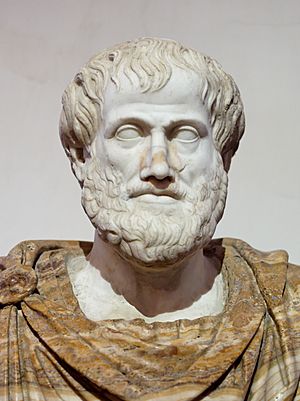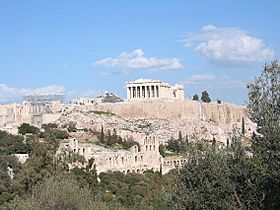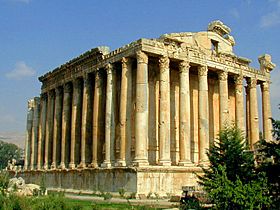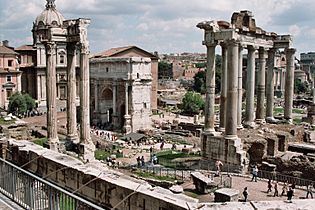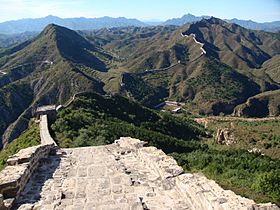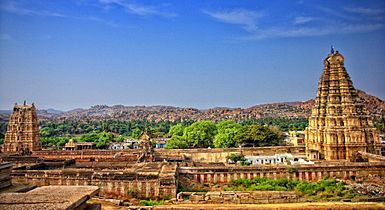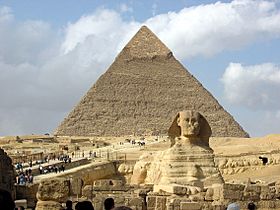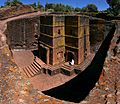Civilization facts for kids
Civilization (or civilisation) comes from the Latin word civis meaning someone who lives in a town. When people are civilised, they live in large well-organized groups like towns, not in small tribes or isolated family groups.
However, a civilization is something more than a town. It is an advanced stage of organisation. That means it has laws, culture, a regular way of getting food and protecting the people. Most civilizations have agriculture, and a system of government like monarchs or elections. They speak a common language, and usually have a religion of some kind. They teach their young the knowledge they need. All civilizations since the Sumerians and the Egyptians have some kind of writing. Writing lets people store and build up knowledge.
The Roman Empire is an example of a large civilization. It was governed from Rome. This empire once stretched from the Scottish borders to North Africa and the eastern Mediterranean. They had their own language, Latin.
Latin became the preferred method of communication among educated people until long after their civilization had vanished. Today lawyers and politicians, doctors and scientists, scholars and others still use Latin in the course of their everyday work, even though the Roman civilization died out more than 1,500 years ago. It is said that William Shakespeare excelled at Latin. Latin is still taught in some schools. We still admire and copy Roman architecture, use Roman numerals to count certain things, use the names of Roman gods to mark the days and months of our calendars, name the constellations in the sky by the same names that the Romans used and we model our Western political constitutions and structures on Roman models (Senate, Governor, election, tribunal, justice, vote, census, even the word Constitution, are all Latin words, their meaning unchanged in thousands of years).
The Roman civilization lasted almost 1000 years, but the Ancient Egyptian civilization was older and lasted longer. The Romans and Egyptians fought each other in the Battle of Actium. Rome won, and Egypt became part of the Roman Empire.
- Examples of civilizations
-
The Temples of Baalbek in Lebanon show us the religious and architectural styles of some of the world's most influential civilizations including the Phoenicians, Babylonians, Persians, Greeks, Romans, Byzantines and Arabs
-
The Roman Forum in Rome, Italy, the political, economic, cultural and religious centre of the Ancient Rome civilization, during the Republic and later Empire, its ruins still visible today in modern-day Rome
-
While the Great Wall of China was built to protect Ancient Chinese states and empires against the raids and invasions of nomadic groups, over thousands of years the region of China was also home to many influential civilizations
-
Ancient Egypt is a canonical example of an early culture considered a civilization.
Dictionary definitions
- An advanced state of intellectual, cultural, and material development in human society, marked by progress in the arts and sciences, an advanced state of moral conduct, the extensive use of record-keeping, including writing, and the appearance of complex political and social institutions.
- The type of culture and society developed by a particular nation or region or in a particular epoch: Maya civilization; the civilization of ancient Rome.
- The act or process of civilizing or reaching a civilized state.
- Cultural or intellectual refinement; good taste.
- Modern society with its conveniences: "We returned to civilization after camping in the mountains".
Images for kids
-
The Acropolis of Athens: Athens is widely referred to as the cradle of Western civilization and the birthplace of democracy.
-
The End of Dinner by Jules-Alexandre Grün (1913). The emergence of table manners and other forms of etiquette and self-restraint are presented as a characteristic of civilized society by Norbert Elias in his book The Civilizing Process (1939).
-
Depiction of united Medes and Persians at the Apadana, Persepolis.
-
The ruins of Mesoamerican city Teotihuacan
-
A world map of major civilizations according to the political hypothesis Clash of Civilizations by Samuel P. Huntington.
-
The pyramids of Giza are among the most recognizable symbols of the civilization of ancient Egypt.
-
The Persepolis in Iran: Pictures of the Gate of All Nations, the main entrance for all representatives of other nations and states. Persepolis appears to have been a grand ceremonial complex, that it was especially used for celebrating Nowruz, the Persian New Year, in 515 BC.
-
The Temples of Baalbek in Lebanon show us the religious and architectural styles of some of the world's most influential civilizations including the Phoenicians, Babylonians, Persians, Greeks, Romans, Byzantines and Arabs.
-
The Roman Forum in Rome, Italy, the political, economic, cultural and religious center of the Ancient Rome civilization, during the Republic and later Empire, its ruins still visible today in modern-day Rome.
-
The Ziggurat of Ur in Iraq. Ziggurats are iconic monuments of ancient Mesopotamian civilization, which developed the first true cities in the world and influenced numerous kingdoms and empires in the Near East and the Mediterranean in domains such as architecture, religion, trade, artisanry, writing, law, and mathematics.
-
While the Great Wall of China was built to protect Ancient Chinese states and empires against the raids and invasions of nomadic groups, over thousands of years the region of China was also home to many influential civilizations.
-
Machu Picchu in Peru is the most recognizable symbol of the Inca civilization in the Andean mountains. One of the New 7 Wonders of the World.
-
El Castillo, at Chichen Itza. The Maya civilization is noted for its logosyllabic script—the most sophisticated and highly developed writing system in pre-Columbian Americas—as well as for its art, architecture, mathematics, calendar, and astronomical system.
-
Notre-Dame de Paris in Paris, France is among the most recognizable symbols of the civilization of Christendom. Western civilization is most strongly influenced by the Greco-Roman and Christian cultures. Christianity has played a prominent role in the shaping of Western civilization.
-
Hagia Sophia in Istanbul, Turkey. An architectural and cultural icon of Byzantine and Eastern Orthodox civilization. Its influence, both architecturally and liturgically, was widespread and enduring in the Eastern Christianity, Western Christianity, and Ottoman architecture. Represents the legacy of the Byzantine Empire one of the most powerful economic, cultural, and military force in Europe, noted for its art, architecture, science, medicine, and law.
-
The Round city of Baghdad was founded by caliph Al-Mansur in 762–766 CE as the capital of the Abbasid Caliphate, setting the stage for the Islamic Golden Age beginning with the subsequent construction of the House of Wisdom. It is the fabled city in One Thousand and One Nights.
-
Borobudur in Indonesia is the world's largest Buddhist monument and represents the Javanese empire of Mataram kingdom, a prominent seaborne civilization and center of scholarship whose religious, cultural, political, and economic influence spread throughout Southeast Asia and into China, India, Tibet, and Korea.
-
Saint Basil's Cathedral in Moscow; the most popular icon of Russian civilization. Russian civilization has had a considerable influence on global culture, it also has a rich material culture and a tradition in science and technology.
-
Angkor Wat in Cambodia is the largest religious structure ever constructed in human history and represents the legacy of the Khmer Empire, one of the most influential civilizations of Southeast Asia and home to the world's biggest preindustrial city by area.
-
Nineveh was an ancient Assyrian city of Upper Mesopotamia, the Assyrian civilization noted for its sculpture, architecture, literature, law and astronomy. Modern Assyrians are Syriac Christians who claim descent from Assyria, one of the oldest civilizations in the world, dating back to 2500 BC in ancient Mesopotamia.
-
Lalibela churches; among the most popular icon of Ethiopia, and represents the legacy of the Kingdom of Aksum, a Classical African civilization.
See also
 In Spanish: Civilización para niños
In Spanish: Civilización para niños


